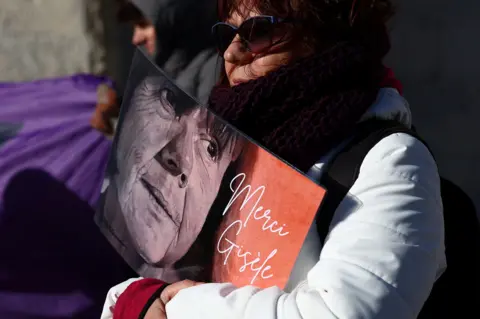Gisèle Pelicot, a French rape survivor, left a court in southern France for the last time on Thursday after her ex-husband was sentenced to 20 years in prison for drugging and raping her, and for invited dozens of strangers to also abuse her for nearly a decade.
Dominique Pelicot, 72, was found guilty of all charges against him by an Avignon judge. He was on trial with 50 other men, all of whom were convicted of at least one count, although their prison sentences were less than those requested by prosecutors.
Although the trial is over, questions remain regarding the Pelicot case and what happens next.
1. What will Gisèle Pelicot do now?
When she first climbed the steps of the Avignon courthouse in September, no one knew the name Gisèle Pelicot. Over the next 15 weeks, her fame as a rape victim refusing to be ashamed of what was done to her grew dizzyingly.
As she left the court on THURSDAYhundreds of people chanted his name and his photo made headlines across the world.
Today she is perhaps one of the best-known women in France. This means that even if she changes her name, it will be impossible for her to return to the anonymity that served her so well as she tried to rebuild her life after her husband's crimes came to light.
Gisèle is not the first person whose unimaginable suffering has made her an icon. At great personal cost, she became the symbol of a fight she never chose. So it seems unlikely that she would want to become an outspoken campaigner against gender-based violence or a leading feminist figure. She might instead return to what she says has always brought her comfort: music, long walks and chocolate – and to her seven grandchildren.
“At the start of the trial, she said, 'If I last two weeks, it will be a long time.' Ultimately, she lasted three and a half months,” said her lawyer Stéphane Babonneau. “Now she is at peace and relieved that it’s all over.”
2. What really happened to Caroline?
A few days after Dominique Pelicot's crimes were revealed, his daughter Caroline Darian was summoned to the police station and shown photos of an apparently unconscious woman wearing unfamiliar lingerie. She later said her life “stopped” when she realized she was looking at photos of herself.
Her father always denied touching her, but Caroline – whose anguish and devastation were on display at many court hearings – said she would never believe him and accused him of looking at her “with eyes incestuous.”
But the lack of evidence of the abuse Caroline says was inflicted on her has led her to call herself the “forgotten victim” of the trial. This notion has visibly seeped into his relationship with his mother. In her memoir – published after her father's arrest – she accuses Gisèle of not showing him enough support, implicitly choosing to side with her rapist ex-husband rather than her daughter.
Although Gisele and her children always sat next to each other in court, often whispering, huddled together, there were signs that the trial was taking a toll on their relationship.
On Friday, Caroline's brother, David, stressed – as he has done before – that the trial was not just about Gisèle but their entire “wiped out family”.
“We kids felt forgotten,” he said. “Quite honestly, I feel that while our attorneys did an outstanding job defending our mother, we were given a little less consideration.”
In her memoir, Caroline lamented Gisèle's “denial as a coping mechanism.”
“Because of my father,” she wrote, “I am now losing my mother.”
3. How many defendants will appeal?
With the exception of Dominique, all of the prison sentences handed down to the defendants were less than those requested by prosecutors.
Several defense attorneys were visibly satisfied, meaning they are unlikely to encourage their clients to appeal their convictions. A man named Jean-Pierre Maréchal was sentenced to 12 years in prison – five less than prosecutors had requested – and his lawyer Patrick Gontard told the BBC it was “out of the question” that he appeals.
 Getty Images
Getty ImagesThe months or years the men spent in pre-trial detention will count towards their sentence total, meaning some could be released soon if they have served their minimum sentence.
A man who faced 17 years in prison was ultimately sentenced to eight years in prison. His lawyer, Roland Marmillot, told the BBC that because he had already spent several years in prison, he would likely be released fairly quickly.
However, the day after the trial closed, two men each sentenced to eight years in prison had already appealed. Others are expected to follow over the next ten days – this is the period during which appeals can be filed.
4. What else could Dominique Pélicot be guilty of?
Dominique Pelicot admitted to having attacked and attempted to rape a 23-year-old real estate agent, known under the pseudonym Marion, in the Paris suburbs in 1999. A cloth soaked in ether was put over her mouth but she managed to fight the 'aggressor. and he ran away. It was only in 2021, after being arrested for the crimes he inflicted on his wife Gisèle, that Pélicot's DNA was cross-referenced with a bloodstain found on Marion's shoe, and that he admitted his guilt.
He has, however, denied responsibility for another cold case – the 1991 rape and murder of another young real estate agent, Sophie Narme, for which there is no DNA. Investigators have argued that the two cases have too many similarities to be a coincidence.
Other unresolved cases in which similar modi operandi were used are also being re-examined.
5. Will the trial be a turning point?
“There will be a ‘before’ and there will be an ‘after’ the Pelicot trial,” a Parisian told the BBC at the start of the trial.
For many, this feeling has only grown over the past few months, during which intense media coverage of the Pelicot trial has generated countless conversations about rape, consent, and gender-based violence.
“What we need to do is impose much harsher sentences,” Nicolas and Mehdi, two residents of Mazan, told the BBC. They said they were “disgusted” when they discovered one of the accused was a man they had played football with.
“With longer sentences, they will at least think twice before doing things like this,” they said, adding that it was “incredibly unfair” that some men could be released from prison in the coming months .
 Reuters
ReutersIt should be noted, however, that the risk of incurring a 20-year prison sentence for aggravated rape did not dissuade Dominique Pelicot from proposing to his unconscious wife that she be raped by strangers he met on the Internet.
There have been calls to reform French rape law to include consent, but this has failed in the past and would require considerable work in France's currently divided Parliament.
Some have argued that schools have a responsibility to better teach new generations about sex, love and consent. Béatrice Zavarro, Dominique Pelicot's lawyer, believes that “the change will not come from the Ministry of Justice but from the Ministry of National Education”.
 EPA
EPAFrançoise, a resident of the neighborhood where Gisèle and Dominique Pelicot lived, told the BBC that she thinks we need to find a way to bridge the gap between what children learn in schools and the type of material they are taught. online access.
“Young people are so exposed to sex on the Internet and at the same time schools are very prudish,” she said. “They should be much more open and frank in corresponding and explaining what children are seeing.”
What these exchanges show is that although it will take time before changes become tangible, a conversation has now begun. This will continue until there are no more unanswered questions.
#unanswered #questions #trial
